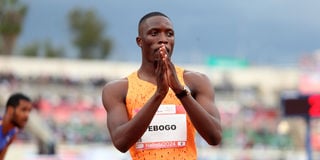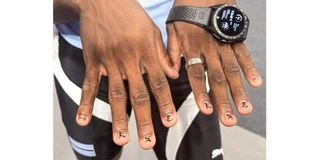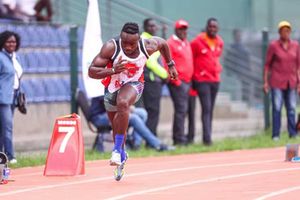
Botswana's Letsile Tebogo reacts after men's 200 metres race during the Absa Kip Keino Classic at Nyayo National Stadium in Nairobi on April 20, 2024.
The village of Kanye in southern Botswana is in a state of euphoria. Its golden son, Letsile Tebogo, has not only brought home Botswana's first Olympic gold medal, but has also changed his life overnight by becoming a millionaire.
At the Paris 2024 Olympic Games, the world witnessed a historic moment when Tebogo burst across the line in the men's 200m race to claim the coveted gold medal and etch his name into the annals of sporting history. The sensational athlete's remarkable achievement has not gone unnoticed.
The 21-year-old made history as the first African to clinch the gold in the event at the Olympics clocking an impressive time of 19.46 seconds, beating Americans Kenny Bednarek and Noah Lyles in Paris on August 8, at Stade de France in Saint-Denis.
He dedicated his win to his late mother, whose initials and birthdate are emblazoned on his spikes: ‘Elisabeth Seratiwa Tebogo' (EST) 23-12-1980.

Botswana sprinter Letsile Tebogo’s finger nails with an inscription of his late mother’s initials during yesterday’s 100 metres heats at the Stade de France.
In celebration of his momentous victory, Botswana declared a half-day public holiday on Friday, August 9, earning everyone a share of the moment.
But Tebogo himself will receive an array of rewards.
Upon their return from France on Tuesday night, August 13, Tebogo and the Botswana Olympic Team were greeted with a hero's welcome at the nation's largest stadium, where over 30,000 people gathered to celebrate their achievements.
The Botswana Government has pledged a 4-bedroom house, showcasing their appreciation for Tebogo’s outstanding performance on the global stage.
Furthermore, a local retail chain company, Choppies Botswana, has pledged a cool 1 million Pula ($75,000) for his golden feat.
The Botswana National Sports Commission (BNSC) has also come through with a substantial cash reward of P250,000 ($18,750) as part of its Performance Incentives and Rewards Policy.
His exceptional achievements in both the 100m and 200m races have earned him $3,600 in cash rewards.
In the 100m, he finished in position six, setting a new National Record (NR) of 9.96. Coupled with other incentives, Tebogo's total earnings from this single race are estimated to be around $260,000.
And the rewards don't stop there.
Tebogo's history-making performance has earned him a national holiday in his honour.
A testament to the impact he has had on the nation, this is a rare and exceptional recognition.
Notably, Tebogo's triumph extends beyond individual accolades.
The 4x400m team, in which he played a pivotal role, has also been promised houses for its exemplary performance.
His selfless contribution to the team is poised to earn him another house, underscoring his commitment to the collective success of Botswana's athletic endeavours.
A deafening roar erupted from the packed Botswana National Stadium as Tebogo stepped up to the microphone.
The newly crowned Olympic champion addressed the nation for the first time since his historic victory in Paris.
Speaking in Setswana with a mixture of English, Tebogo said: “Greetings to everyone. First of all, I would like to say thank you to the team, from the manager to the coach.
“I would also like to thank the government for flying my family over to see me do great, I'm grateful for that also. We have people who stay abroad and they supported us in Paris and those back home in Botswana filling the stadium to capacity, we felt your support from Paris, I thank you.”
Tebogo received enormous support not just in Botswana but across the continent, including Kenya. His connection with Kenya goes beyond competition.
The bustling city of Nairobi holds a special place in the heart of the Botswana sprint sensation. It was in Nairobi, during the 2018 World Under-20 Athletics Championships, that Tebogo first made his mark on the global stage by winning the 200 meters.
Since then, Nairobi has become a second home for Tebogo. The Kip Keino Classic, an annual sports extravaganza, has become a key event for the track star.
The energetic atmosphere and intense competition provide an ideal platform for him to showcase his skills. The feeling is mutual. Kenyans have embraced Tebogo, wholeheartedly cheering him on with the same passion as they would their own athletes.
When he secured the Olympic gold in Paris, many Kenyans proudly claimed him as one of their own.
Tebogo’s journey from a promising young athlete to an Olympic champion is a narrative that resonates across boundaries, making him a true ambassador for the sport and a symbol of unity between Botswana and Kenya.
He is on record thanking Kenyans after taking part in his sixth Kip Keino classic race back in April, leading to the 2024 Olympics.
Tebogo expressed his gratitude to Kenya for hosting an incredible event and conveyed his appreciation for the immense love and hospitality displayed by the Kenyan people. He described the experience as making him feel "completely at home" and highlighted the exceptional warmth of the Kenyan people, which he found "indescribable."
Portia Mlilo, a Botswana Television sports journalist, has witnessed Tebogo's development from his junior school days at the CUCSA Games, highlighting the significant role of school sports in nurturing his talent. There, they called him ‘school boy.’ But he swept aside competitors like the wind, on the school track.
"There’s a teacher who identified him and developed him,” Mlilo noted, acknowledging the grassroots efforts that laid the foundation for Tebogo's success.
Mlilo also credits the Gaborone Meet organised by retired Botswana middle-distance runner Glody Dube for bringing Tebogo into the national spotlight.
It was there that Batswana first recognised his potential, and Mlilo herself started to believe he could one day claim gold for Botswana.
Despite excelling in both the 100m and 200m, Mlilo believes Tebogo's strength lies in the 200m due to his slower starts.
Mlilo also emphasised the crucial role of government support and school sports in Botswana's athletics success.
She commended the government for providing financial aid, enabling athletes to train at High-Performance Centres in South Africa despite the lack of adequate facilities in Botswana. She further underscored the importance of recognising the contributions of school sports and coaches at the grassroots level.
“We celebrate the national team coaches, but we fail to trace and look back where these athletes come from. School sports is playing a huge part."
Botswana's golden boy, Letsile Tebogo, stands as a testament to the power of dedicated coaching, grassroots development, and government support in fostering athletic excellence.






